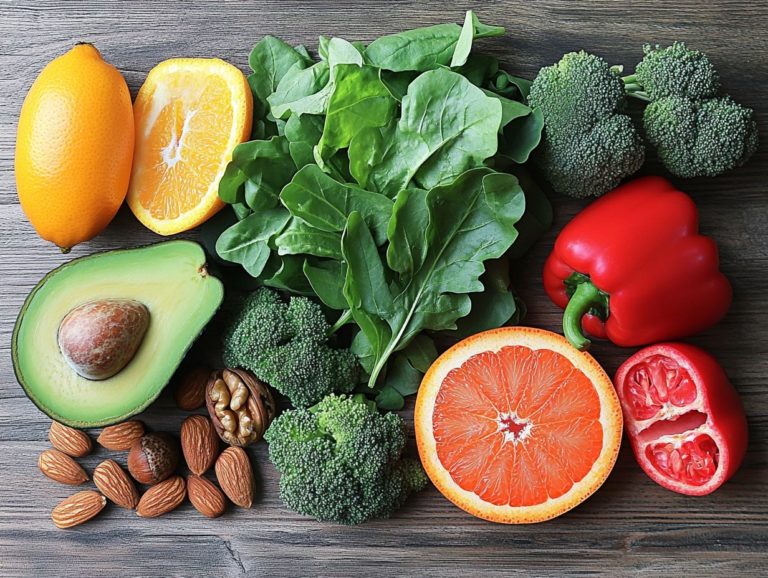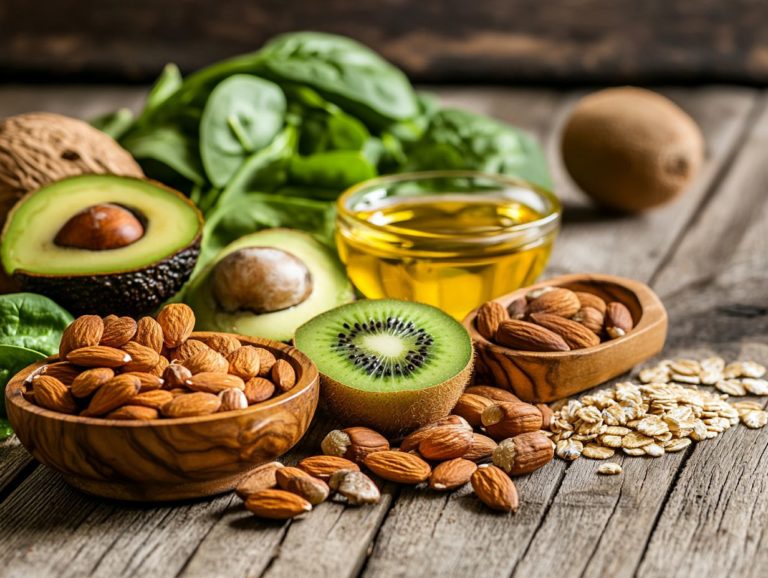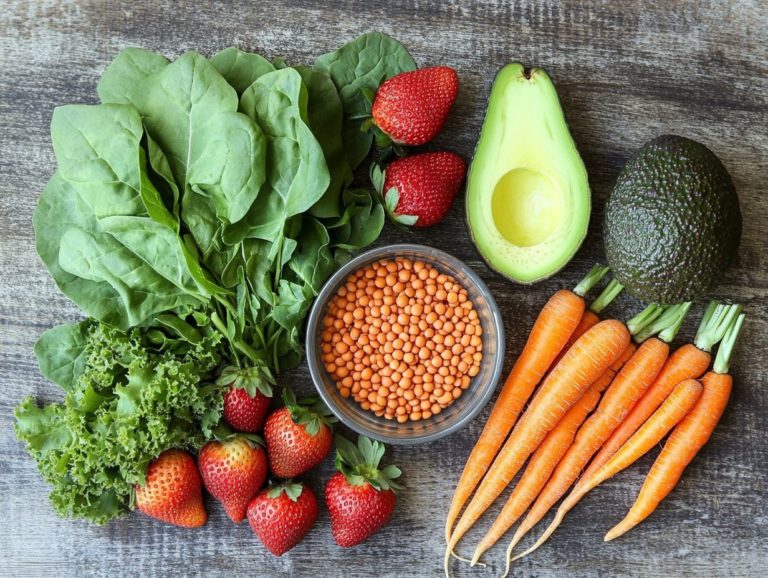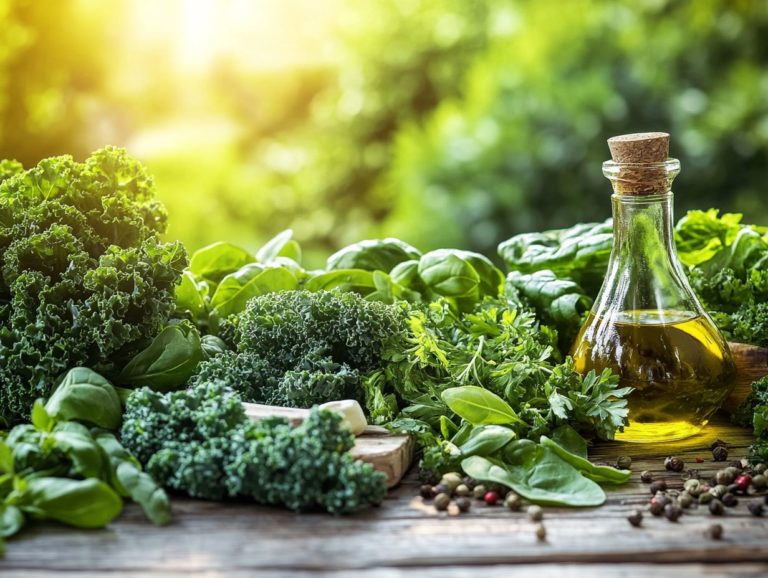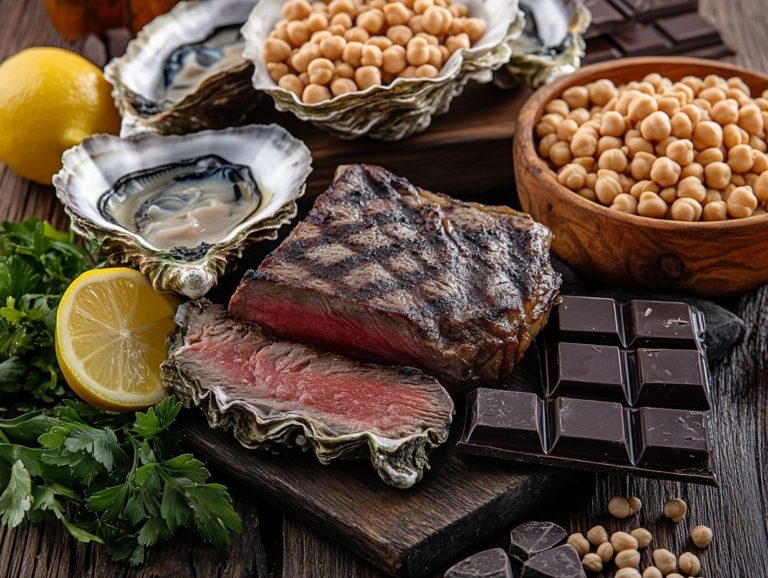The Best Plant-Based Sources of Protein
Are you aiming to enhance your protein intake while fully committing to a plant-based lifestyle? You have landed in the right place.
This article explores a wide variety of delicious and nutritious plant-based protein sources that will help you meet your dietary needs without compromising on flavor. From hearty legumes to nutrient-dense seeds and innovative options like tofu and tempeh, you ll find everything you need to elevate your meals.
Get ready to discover exciting options that benefit you and the planet!
Contents
- Key Takeaways:
- 1. Beans and Legumes
- 2. Nuts and Seeds
- 3. Quinoa
- 4. Tofu y Tempeh
- 5. Edamame
- 6. Lentils
- 7. Chickpeas
- 8. Green Peas
- 9. Nutritional Yeast
- 10. Spinach: The Nutrient Powerhouse
- 11. Broccoli: The Green Powerhouse
- 12. Hemp Seeds
- 13. Chia Seeds
- 14. Seitan
- 15. Spirulina
- Frequently Asked Questions
- What are the best plant-based sources of protein?
- How much protein do these sources contain?
- Can plant-based sources of protein provide all the essential amino acids?
- Are these sources easily digestible?
- Can these sources be used in place of animal-based protein?
- How can I add more plant-based protein to my diet?
Key Takeaways:
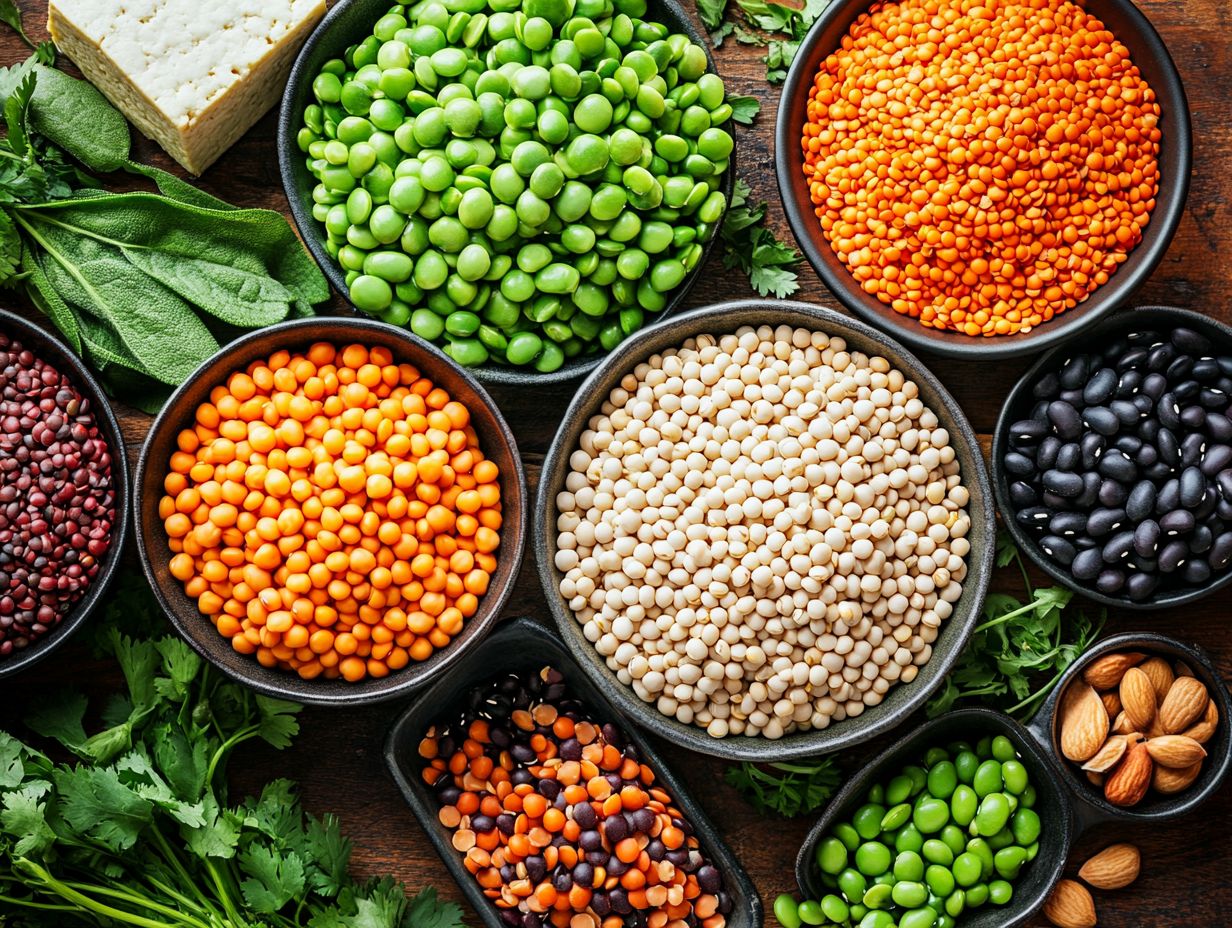
Include a variety of beans and legumes in your diet for a good source of plant-based protein. These include lentils, chickpeas, and green peas.
Incorporate nuts and seeds into your meals and snacks to boost your protein intake. Options include almonds, sunflower seeds, and chia seeds.
Try incorporating quinoa into your diet as a protein-rich alternative to grains. It is also a good source of essential amino acids.
1. Beans and Legumes
Beans and legumes rank among the most nutritious plant-based protein sources you can incorporate into your diet. They are rich in the building blocks of protein that your body needs and packed with health benefits that support a plant-forward lifestyle.
These foods may help lower the risk of chronic diseases like heart disease and diabetes. Their versatility in meal planning opens the door to a plethora of delicious options, making them a cornerstone of healthy eating habits.
Among the various choices, black beans, chickpeas, lentils, and kidney beans each bring unique nutritional profiles to the table, abundant in fiber, vitamins, and vital minerals such as magnesium and folate.
Incorporating these nutrient powerhouses into your meals not only boosts your protein intake but also promotes digestive health and sustains energy levels throughout the day.
Registered dietitians recommend cooking methods like boiling, steaming, or roasting to maintain their nutritional integrity and enhance flavor. They suggest adding legumes to salads, soups, and stews, advocating for a dietary portion of about half a cup to support a balanced plant-based diet.
For practical tips, blend chickpeas into creamy hummus or toss lentils into your pasta for an easy protein boost.
2. Nuts and Seeds
Nuts and seeds are exceptional sources of plant-based, protein-rich nutrition that not only provide essential amino acids but also offer numerous health benefits, making them essential components of any healthy eating plan.
Among the rich variety available, almonds, walnuts, chia seeds, and flaxseeds truly shine with their distinctive nutritional profiles.
-
Almonds stand out for their impressive vitamin E content, which supports healthy skin and bolsters your immune function.
-
Walnuts are a powerhouse of omega-3 fatty acids, vital for maintaining heart health.
-
Chia and flaxseeds are brimming with fiber and antioxidants, aiding digestion and fighting inflammation.
By incorporating these nutrient-dense foods into your balanced, plant-forward diet, you can significantly decrease your reliance on animal-based protein sources, thereby reducing your carbon footprint. This conscious shift enhances your personal well-being and contributes to a more sustainable ecosystem.
3. Quinoa
Quinoa stands out as a remarkable grain, celebrated for being a complete protein. This makes it an exceptional choice for your plant-based diet, helping you meet your nutritional needs while reaping numerous health benefits.
Its outstanding nutritional profile is packed with essential amino acids, fiber, vitamins, and minerals that significantly enhance your overall well-being.
In terms of cooking, quinoa is incredibly versatile it can be boiled, steamed, or tossed into salads, serving as a delightful base for countless dishes.
In your meal planning, quinoa can act as a hearty side or be perfectly blended with an array of vegetables and legumes to craft satisfying vegan meals. Its adaptability allows quinoa to shine in a variety of recipes, whether you’re whipping up comforting bowls, vibrant stir-fries, savory pancakes, or using it as a gluten-free substitute in your favorite baked goods.
Try incorporating these protein sources into your next meal and enjoy the benefits they bring to your health and the environment!
4. Tofu y Tempeh
Tofu and tempeh are fantastic sources of plant protein. They also offer numerous health benefits, especially for vegans.
Both come from soybeans but differ in texture and flavor. Tofu is soft and blends well in soups and smoothies.
Tempeh, being firmer and fermented, works great in salads and sandwiches.
Tempeh usually has more protein and includes fiber and probiotics that benefit gut health. You can grill, saut , or marinate both for endless meal ideas!
5. Edamame
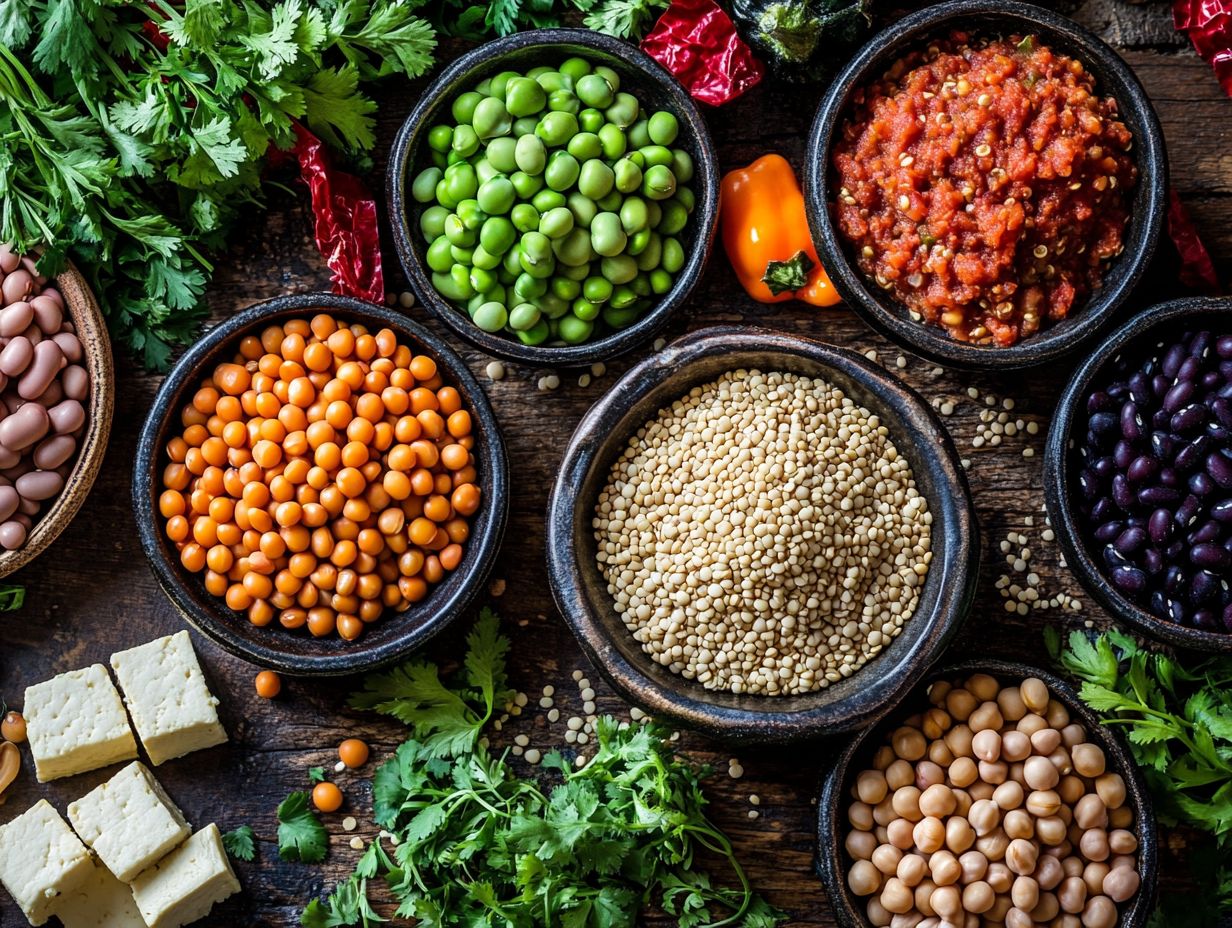
Edamame are young soybeans packed with nutrition. They are an excellent source of plant protein!
These beans are rich in amino acids, fiber, vitamins, and minerals. They add color and a sweet flavor to many dishes.
Steam the pods and sprinkle with sea salt for a tasty treat. You can also toss them with sesame oil and garlic for a flavor boost. Use edamame in dips or pasta for extra nutrition!
6. Lentils
Lentils are a powerful source of plant protein. They provide many health benefits and are essential for meal planning.
With varieties like green, brown, red, and black, these legumes are full of vitamins and minerals. Green lentils are great for salads, while red lentils are perfect for soups.
Incorporate lentils easily into your meals. Add them to stir-fries, curries, or dips. They cook quickly and enhance any dish!
7. Chickpeas
Chickpeas, also known as garbanzo beans, are a great plant protein source. They are vital for anyone following a vegan diet.
These legumes are rich in fiber, vitamins, and minerals. They support digestive health and help manage weight.
Chickpeas have a nutty flavor and creamy texture. Roast them for a crunchy snack or simmer in soups!
Use chickpeas in salads, stews, or hummus for delicious, nutritious meals. They open up a world of cooking possibilities!
8. Green Peas
Green peas are a delightful and nutritious addition to your plant-based diet. They offer a wealth of plant-based protein, plus a host of health benefits and impressive nutritional value.
These vibrant legumes are packed with essential vitamins and minerals, including vitamin C, vitamin K, and several B vitamins. They bolster your immune function and contribute to healthy skin and bone density.
With a commendable protein profile, green peas serve as an excellent energy source, making them particularly advantageous for those embracing a vegetarian or vegan lifestyle.
You’ll find numerous cooking methods to incorporate them into your meals. Whether you steam, saut , or blend them into soups and purees, green peas enhance a variety of dishes.
Their subtle sweetness balances flavors beautifully. Toss them into stir-fries, mix them into salads, or add them to pasta dishes.
9. Nutritional Yeast
Nutritional yeast is a standout plant-based food that provides a solid source of protein and a myriad of health benefits. It’s especially beneficial for those embracing a vegan lifestyle.
This versatile supplement is rich in essential vitamins, especially B12, and elevates the nutritional value of many meals. Its cheesy, nutty flavor makes it a delightful addition to everything from pasta and popcorn to soups and salads.
Sprinkling it on your dishes enhances the taste while infusing your meals with added fiber and antioxidants. This blend of amino acids provides a complete protein, making it an exceptional choice for optimizing your dietary intake.
Dare to experiment with nutritional yeast; it can transform ordinary recipes into true culinary delights.
10. Spinach: The Nutrient Powerhouse
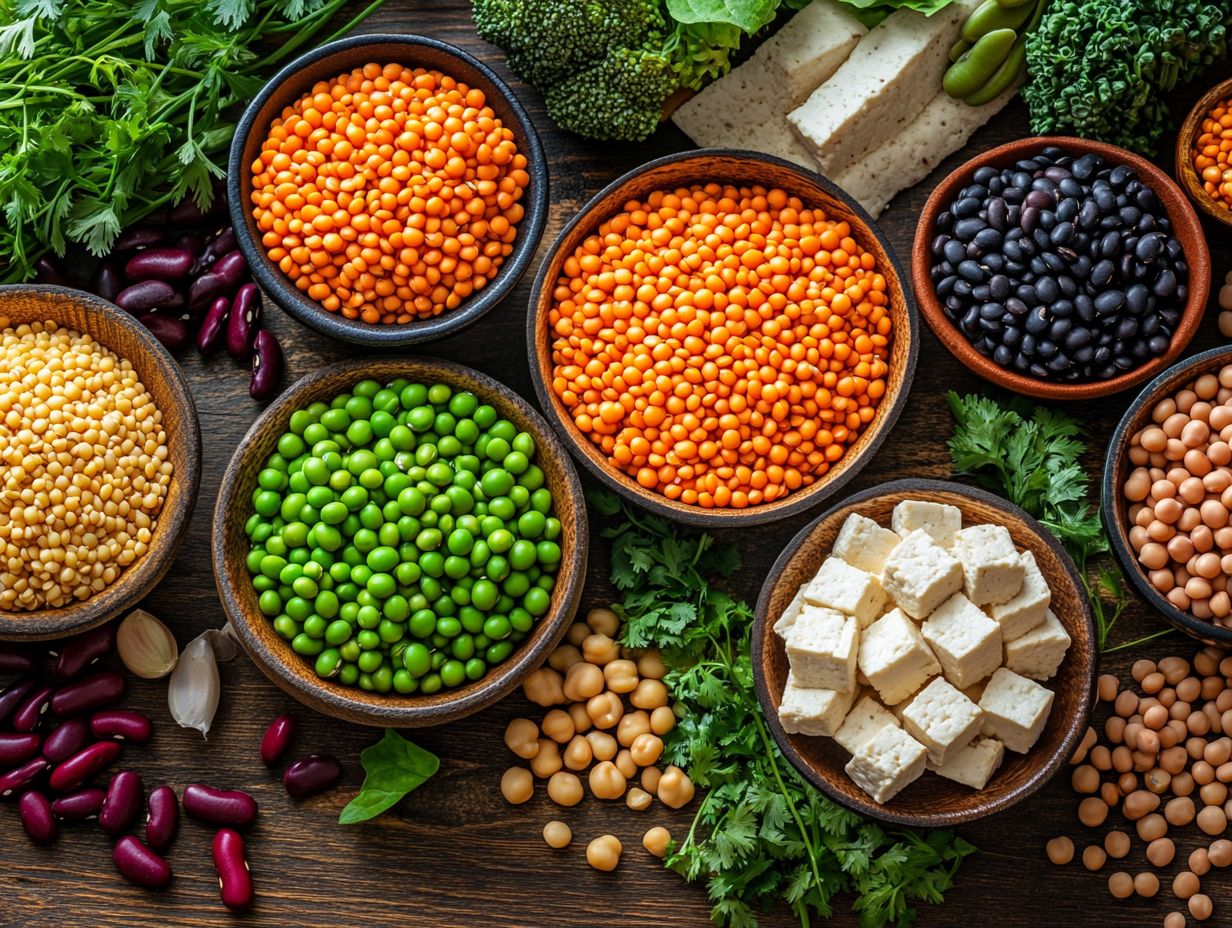
Spinach is a leafy green that brings remarkable health benefits to your plate. It serves as a key player in many plant-based meals, delivering essential nutrients to support a well-rounded diet.
Rich in vital vitamins like A, C, and K, along with a robust selection of minerals such as iron and magnesium, this versatile vegetable elevates a range of dishes.
Its mild flavor and tender texture make it perfect for smoothies, salads, stir-fries, and even pasta creations.
For those embracing a vegan lifestyle, spinach stands out as an excellent source of plant-based protein and dietary fiber. It helps you feel full and supports digestion.
Don t miss out on incorporating this superfood into your meals! You not only bolster muscle health and immune function but also enhance your overall well-being.
11. Broccoli: The Green Powerhouse
Broccoli isn t just a tasty vegetable; it’s a powerhouse of plant-based goodness that brings a wealth of health benefits to your table. This vibrant green gem is loaded with essential nutrients, including protein, making it a smart choice for anyone looking to enhance their diet.
Rich in vitamins C, K, and A, along with fiber and antioxidants, broccoli significantly elevates your overall health. Its anti-inflammatory properties are a formidable ally against various chronic diseases, making it a must-have in your culinary arsenal.
Whether you choose to steam, roast, or stir-fry it, broccoli seamlessly complements salads, pastas, and even smoothies.
Incorporating this nutritious vegetable into your meals boosts your nutrition and keeps your taste buds satisfied, paving the way for a healthier lifestyle without compromising on flavor.
12. Hemp Seeds
Hemp seeds are a powerhouse of nutrition. They offer plant-based protein and a host of health benefits, making them an exceptional choice for anyone dedicated to balanced meal planning.
These tiny seeds are packed with essential amino acids and boast an impressive protein content of about 30% by weight, making them a stellar option for both vegetarians and vegans.
Their rich profile includes healthy fatty acids, such as omega-3 and omega-6, which are vital for heart health and overall well-being.
You can effortlessly incorporate hemp seeds into your diet by:
- Tossing them into smoothies,
- Sprinkling them on salads or yogurt,
- Using them in your baking endeavors.
A simple sprinkle on your oatmeal or a blend into sauces adds a delightful nutty taste along with a substantial nutrient boost.
13. Chia Seeds
Chia seeds may be tiny, but they pack a powerful punch as a plant-based protein source. They are brimming with health benefits and nutritional value that can elevate your meal planning.
These little seeds load up on omega-3 fatty acids, fiber, and essential minerals, offering an impressive nutritional profile that supports heart health, digestion, and overall wellness.
Their remarkable ability to absorb liquid and expand makes them both a nutritious choice and a versatile ingredient in your culinary toolkit.
Whether you re whipping up smoothies, crafting puddings, tossing them into salads, or baking goods, chia seeds can be seamlessly integrated to enhance both texture and flavor.
They also serve as an excellent egg substitute in vegan recipes and can effortlessly be sprinkled on yogurt or oatmeal for an extra nutrient boost.
14. Seitan
Seitan, a meat substitute made from wheat protein, stands as a premier plant-based protein option for discerning vegans. It offers a plethora of health benefits that make it a stellar addition to your meal planning.
Its remarkable texture closely mimics that of meat, allowing it to shine as a versatile ingredient in a variety of satisfying dishes. With its high protein content and low fat, seitan serves as an exceptional source of essential amino acids, supporting muscle growth and overall well-being.
This gluten-based protein excels at absorbing flavors, unlocking a world of culinary possibilities.
Try grilling, saut ing, or simmering it in broth the options are virtually limitless. Imagine crafting a savory seitan stir-fry, whipping up hearty vegan tacos, or enjoying a delectable barbecue sandwich all showcasing the adaptable nature of this remarkable ingredient in any meal.
15. Spirulina
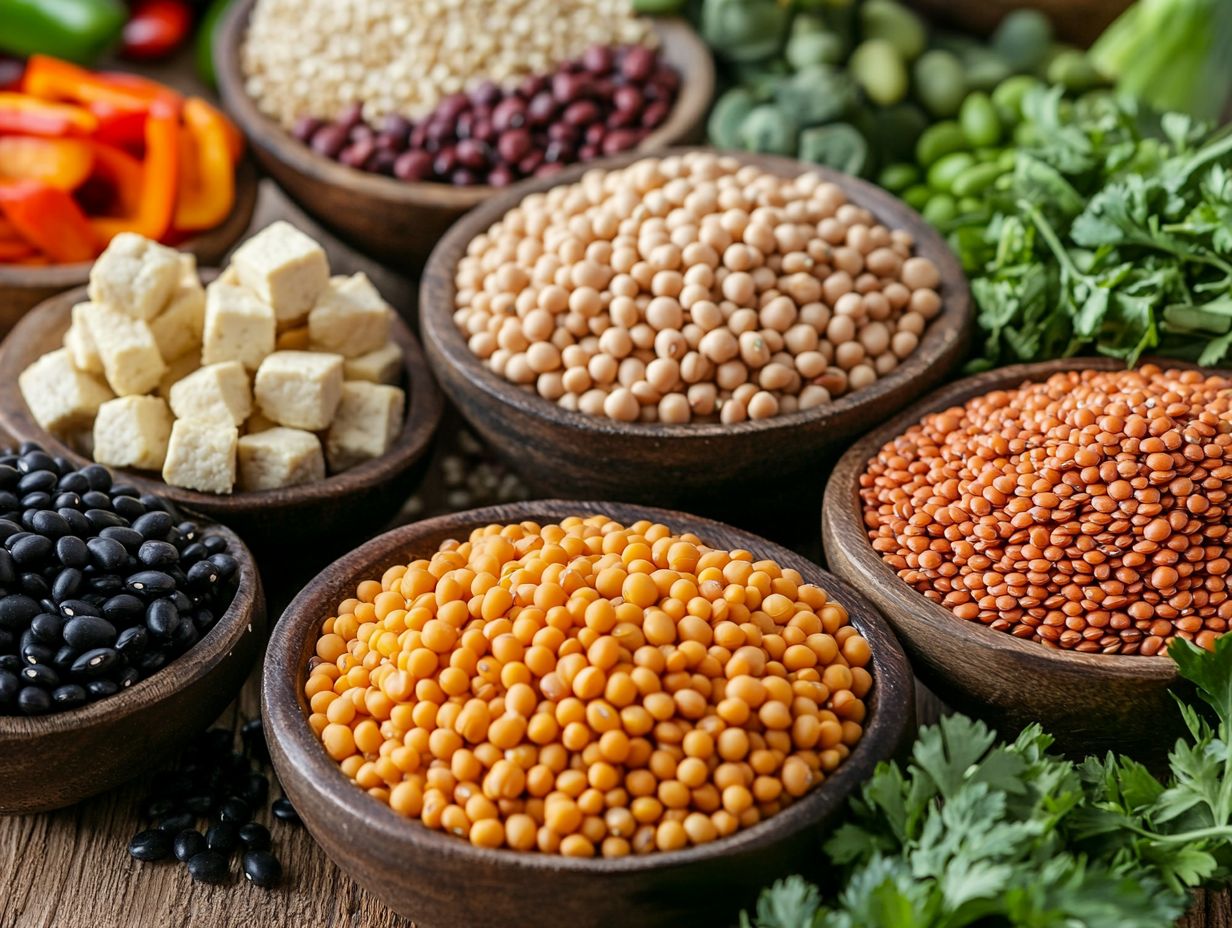
Spirulina, the blue-green algae hailed as a superfood, is a remarkable addition to your diet, especially if you’re following a vegan lifestyle. It s brimming with plant-based protein and a wealth of health benefits that make it a valuable dietary supplement.
Rich in essential vitamins, minerals, and antioxidants, this nutritional powerhouse can boost your energy levels, support immune function, and promote radiant skin.
Incorporating spirulina into your daily routine is a breeze; it blends easily into smoothies, infusing them with a vibrant green hue and an impressive nutrient boost.
Health enthusiasts often sprinkle spirulina into snacks like energy balls or homemade granola, delivering an extra healthful punch. You can even incorporate it into salad dressings or soups, enhancing both health benefits and flavor.
Its versatility makes spirulina a go-to for anyone looking to elevate their culinary creations while prioritizing well-being.
Frequently Asked Questions
What are the best plant-based sources of protein?
- Legumes (beans, lentils, peas)
- Tofu
- Tempeh
- Nuts and seeds
- Quinoa
- Edamame
- Soy products like soy milk and soy protein powder
How much protein do these sources contain?
The amount of protein varies depending on the source, but generally:
- Legumes contain around 15-20 grams of protein per cooked cup
- Tofu contains around 10-19 grams per 3 oz serving
- Nuts and seeds contain around 5-7 grams per 1 oz serving
Can plant-based sources of protein provide all the essential amino acids?
Yes, most plant-based sources of protein contain all the essential amino acids. However, some may be lower in certain amino acids than others. It is important to vary your protein sources and eat a variety of plant-based foods to ensure you are getting all the essential amino acids.
Are these sources easily digestible?
Plant-based sources of protein are generally easy to digest, and they can even be easier on the digestive system compared to animal-based protein sources. This is because plant-based protein is typically lower in fat and contains more fiber, making it easier for the body to break down and utilize.
Can these sources be used in place of animal-based protein?
Yes, plant-based sources of protein can definitely be used in place of animal-based protein. In fact, incorporating more plant-based protein into your diet can have numerous health benefits, such as reducing your risk of heart disease and improving overall health and well-being.
Explore these top vegan protein sources for lifters and discover how easy it is to incorporate them into your meals for a healthier lifestyle!
How can I add more plant-based protein to my diet?
Start by swapping meat for tofu or tempeh in your stir-fries. Add beans to your soups or salads for a protein boost.
Snack on nuts and seeds instead of processed options. Don’t be afraid to try new plant-based recipes and include more whole foods in your meals!

